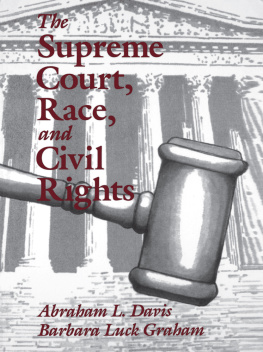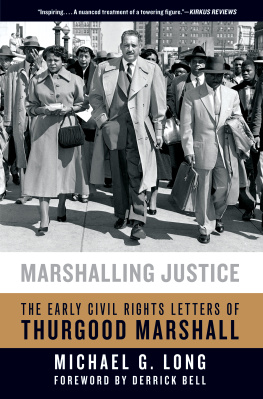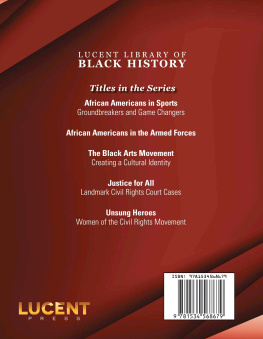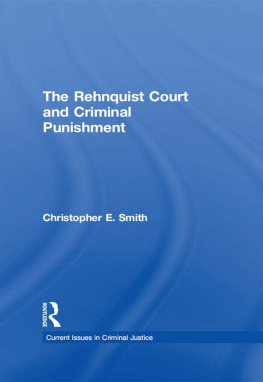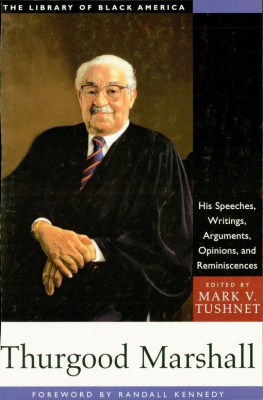Abraham L. Davis - The Supreme Court, Race, and Civil Rights: From Marshall to Rehnquist
Here you can read online Abraham L. Davis - The Supreme Court, Race, and Civil Rights: From Marshall to Rehnquist full text of the book (entire story) in english for free. Download pdf and epub, get meaning, cover and reviews about this ebook. year: 1995, publisher: SAGE, genre: Politics. Description of the work, (preface) as well as reviews are available. Best literature library LitArk.com created for fans of good reading and offers a wide selection of genres:
Romance novel
Science fiction
Adventure
Detective
Science
History
Home and family
Prose
Art
Politics
Computer
Non-fiction
Religion
Business
Children
Humor
Choose a favorite category and find really read worthwhile books. Enjoy immersion in the world of imagination, feel the emotions of the characters or learn something new for yourself, make an fascinating discovery.
- Book:The Supreme Court, Race, and Civil Rights: From Marshall to Rehnquist
- Author:
- Publisher:SAGE
- Genre:
- Year:1995
- Rating:4 / 5
- Favourites:Add to favourites
- Your mark:
- 80
- 1
- 2
- 3
- 4
- 5
The Supreme Court, Race, and Civil Rights: From Marshall to Rehnquist: summary, description and annotation
We offer to read an annotation, description, summary or preface (depends on what the author of the book "The Supreme Court, Race, and Civil Rights: From Marshall to Rehnquist" wrote himself). If you haven't found the necessary information about the book — write in the comments, we will try to find it.
Abraham L. Davis: author's other books
Who wrote The Supreme Court, Race, and Civil Rights: From Marshall to Rehnquist? Find out the surname, the name of the author of the book and a list of all author's works by series.
The Supreme Court, Race, and Civil Rights: From Marshall to Rehnquist — read online for free the complete book (whole text) full work
Below is the text of the book, divided by pages. System saving the place of the last page read, allows you to conveniently read the book "The Supreme Court, Race, and Civil Rights: From Marshall to Rehnquist" online for free, without having to search again every time where you left off. Put a bookmark, and you can go to the page where you finished reading at any time.
Font size:
Interval:
Bookmark:

 | SAGE Publications, Inc. 2455 Teller Road Thousand Oaks, California 91320 E-mail: |
| SAGE Publications Ltd. 6 Bonhill Street London EC2A 4PU United Kingdom | |
| SAGE Publications India Pvt. Ltd. M-32 Market Greater Kailash I New Delhi 110048 India |
p. cm.
Includes bibliographical references and index.
ISBN 0-8039-7219-9.ISBN 0-8039-7220-2
1. Race discriminationLaw and legislationUnited States. 2. Civil rightsUnited States 3. United StatesSupreme Court. I. Graham, Barbara Luck. II. Title.
KF4755.D38 1995
342.73085dc20
| [347.30285] | 95-12923 |
Sage Typesetter: Danielle Dillahunt
The Marshall and Taney Eras, 1801-1864
Reconstruction and National Protection of Civil Rights
The Nadir in the Quest for Equality
Blacks Abiding Faith in Democracy
The Dawning of Hope
The Scottsboro Case
The Birth of Discrete and Insular Minorities
The Japanese Internment Cases
The Beginning of the Demise of the Separate-but-Equal Doctrine
A First for an Education Case
Protecting Racial and Religious Groups from Defamation
The Attack on the NAACP
From Litigation to Congressional Action
The Application of Brown in Other Contexts
Lawful and Unlawful Conduct
Equal or Unequal?
Criminal and Civil Remedies
A Persistent Problem
Constitutional Issues
The Era of Ambivalence and Uncertainty, 1969-1986
The Problem of Minority Vote Dilution
The Increasing Significance of Race and Class
Fair Housing and Standing to Sue
Swain Revisited
The Era of Retrenchment and Unpredictability, 1986-1995
A Relaxation of Federal Court Supervision
A Cramped View of Title VII
A Problem for the 21 st Century
Removing Barriers to Expeditious Executions
The Clash Between Free Speech and Equality
The Politics of Race and the Role of Ideology
Race and the Criminal Justice System
A Nationwide Problem
Font size:
Interval:
Bookmark:
Similar books «The Supreme Court, Race, and Civil Rights: From Marshall to Rehnquist»
Look at similar books to The Supreme Court, Race, and Civil Rights: From Marshall to Rehnquist. We have selected literature similar in name and meaning in the hope of providing readers with more options to find new, interesting, not yet read works.
Discussion, reviews of the book The Supreme Court, Race, and Civil Rights: From Marshall to Rehnquist and just readers' own opinions. Leave your comments, write what you think about the work, its meaning or the main characters. Specify what exactly you liked and what you didn't like, and why you think so.

